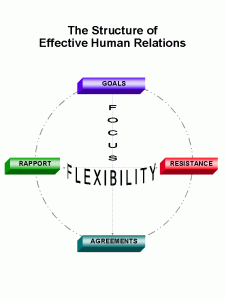Rapport is the foundation of all successful communication.
Rapport happens naturally, and forms an unconscious bridge between people. Rapport and relationship skills are essential ingredients in the recipe for business success. Can you tell if your communication is being taken the wrong way? Do you have tools to quickly and easily discern why you lost rapport and quickly get back on track?
Relationships are built on the basis of responsiveness and attention to what arises each moment. When do you need to build rapport? Before delivering information (to produce listening, otherwise you’re wasting each other’s time), interviewing a customer, coaching an employee, … before and during engaging in a negotiation, before attending a meeting. Whenever we must gain the other party’s complete attention, and of course building rapport includes having an awareness of what they are trying to accomplish, even if your goals are all you consciously care about.
This means taking your attention off your own goal, or off yourself entirely, and onto others, at the right times.
Who do you know who is fantastic at rapport? What do they do that you don’t? Some simple diagnostics:
- How can you tell whether or not you have rapport?
- Do you periodically “check in” during a conversation to ensure that you have mutual understanding?
- If the other person or group seems disinterested, do you ignore it, and keep leading toward your goal, or can you do something about it without losing track of what you want?
Neuroscience research reveals that there are signals of rapport that we all use that go well beyond culture and language. Short term rapport is created by matching the other person verbally and (sometimes even more important, yet overlooked) non-verbally. By matching and mirroring certain aspects of the other person’s behavior, we become more sensitive and tuned into that person’s reality.
With time, as rapport becomes more fully established, the interaction resembles a dance. Each person mirrors the other, and it is impossible to say who leads or follows.
Balancing focus and assertiveness toward goals with flexibility in the relationship means knowing when to lead toward goals and agreements and when to slow down and focus on the relationship.

When effective leaders encounter resistance or negativity, it may be time to “go slow to go faster.” Leading and laying back at the right times ensures adequate inclusion and involvement to build a culture of commitment. This asset becomes key to collaboration as well as gaining buy-in to change and improvement efforts.
Articles:
- Rapport: The Link to Gaining Cooperation
- The Reactionary Tango: Turning Opposition to Understanding through Aikido
- Seven Attitudes to Dissolve Conflicts
Relevant Skills or Coursework:
- All communication skills-related courses
- Separating interpretations from observable facts
- Managing interpersonal differences
- Managing meetings
Short presentation available? Yes; Length: 1-2 hrs.


